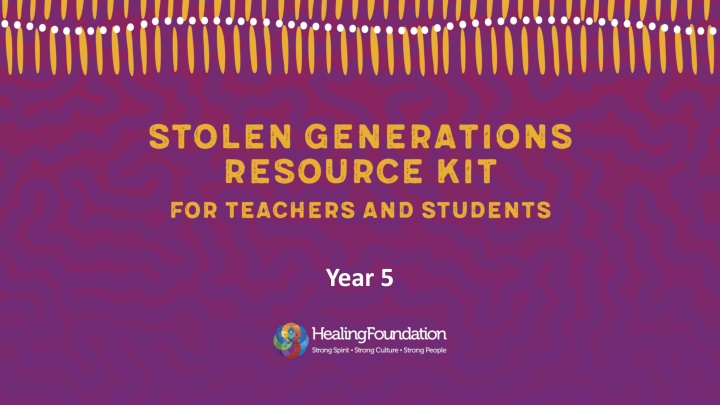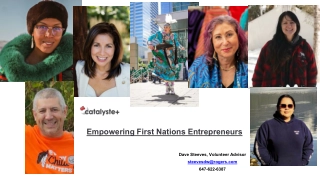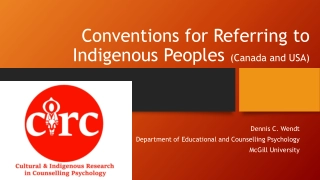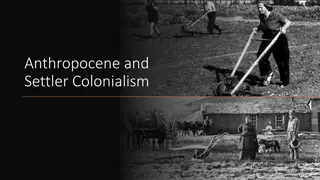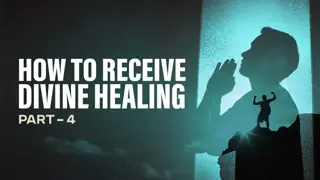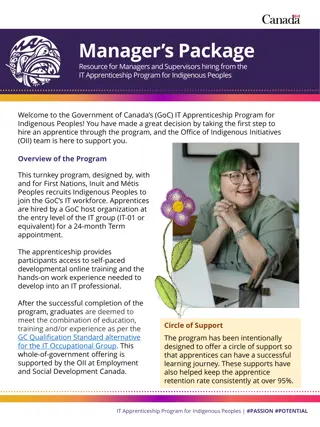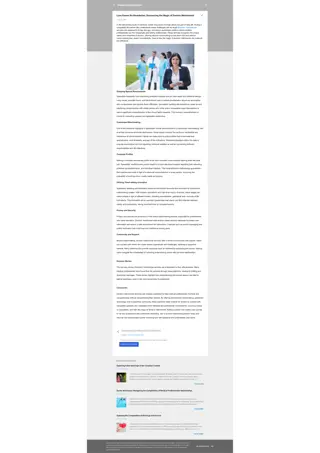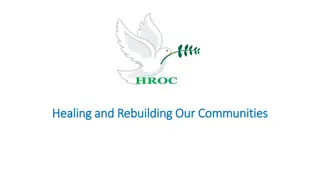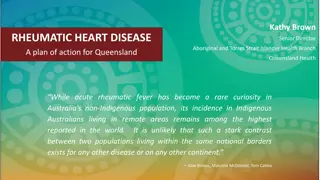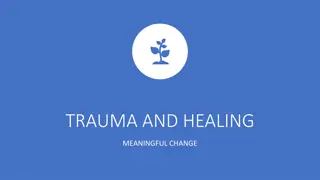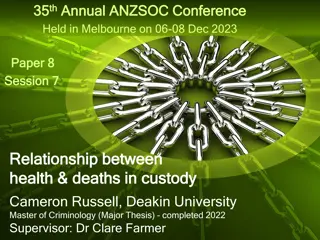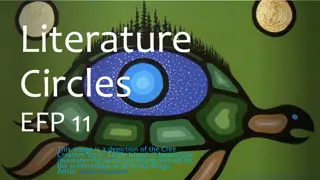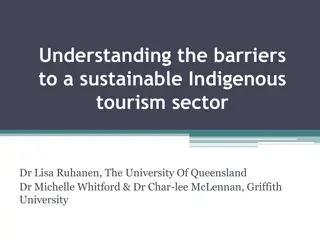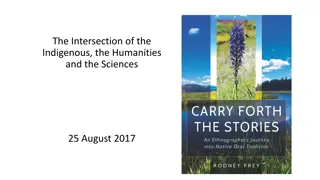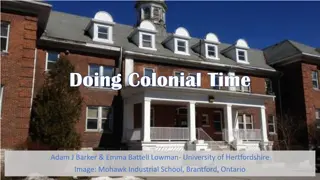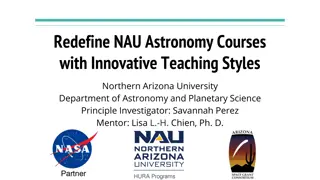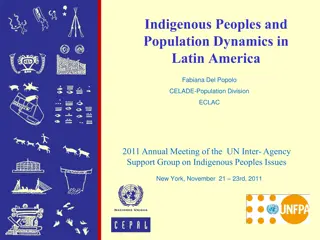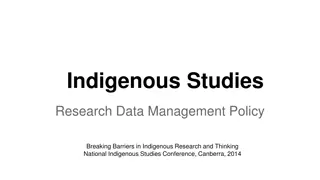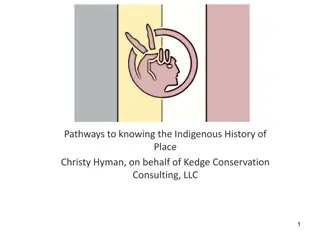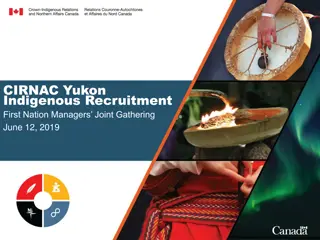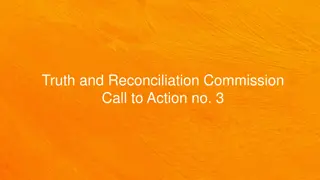Indigenous Histories and Healing Together in Education
This educational program acknowledges the traditional custodians of the land and aims to create a safe and respectful environment for learning about the Stolen Generations. Through literature, poetry, research, and reflection activities, students engage in understanding Australia's history, the impact of past policies, and the importance of reconciliation. Cultural safety and respectful discussions are emphasized, fostering empathy, awareness, and healing.
Download Presentation

Please find below an Image/Link to download the presentation.
The content on the website is provided AS IS for your information and personal use only. It may not be sold, licensed, or shared on other websites without obtaining consent from the author.If you encounter any issues during the download, it is possible that the publisher has removed the file from their server.
You are allowed to download the files provided on this website for personal or commercial use, subject to the condition that they are used lawfully. All files are the property of their respective owners.
The content on the website is provided AS IS for your information and personal use only. It may not be sold, licensed, or shared on other websites without obtaining consent from the author.
E N D
Presentation Transcript
Acknowledgement [Name of school/class] acknowledges Country, Custodians and Community of the lands on which we are on today [insert name of land/ peoples]. We also pay our respects to Elders and to Stolen Generations survivors, of the Dreaming and of the here and now. We recognise the ongoing nature of trauma experiences for First Nations peoples and commit each day to survivor-led intergenerational healing.
Aboriginal and Torres Strait Islander students and teachers should be aware that these resources may contain the names, images, and voices of deceased persons.
Care and safety These lessons might include some content that is confronting or overwhelming We all need to understand a full history of Australia, including the experiences of Stolen Generations survivors, their families and communities, and the impacts of past government policies that are still being felt today It is important to speak to me or another adult if at any point you feel distressed we are all here to learn together and keep each other safe.
Healingtogether Why is learning about the Stolen Generations important? to change the way we look at our collective history. to support reconciliation and an honest understanding of our past not just one perspective. to become aware of past government policies that still affect many Aboriginal and Torres Strait Islander peoples and families today.
Overview: this weeks activities ACTIVITY 1: LITERATURE INTRODUCTION (40 60 MINUTES) Teacher leads students in a guided reading session. Students respond to questions about the text and create one- word responses as a group. ACTIVITY 2: POETRY RESPONSE (40 60 MINUTES) Students read and analyse contemporary poems by Indigenous poets and participate in group discussions to compare and contrast the poems. ACTIVITY 3: RESEARCH TASK (60 80 MINUTES) Students work in groups to draw information from a variety of sources. ACTIVITY 4: POETRY RESPONSE TO LEARNING (40 60 MINUTES) Students reflect on and share their learning by writing a poem and creating a poster for display.
Cultural Safety How does a safe classroom look to you? How does it feel? How can we be culturally safe?
Cultural Safety Open Respect mindedness Being mindful of privilege Honest communication
Terminology Country Sorry Aboriginal Reconciliation Colonisation Torres Strait Islander Culture
Activity 1: Literature Introduction
Aboriginal and Torres Strait Islander Culture and history: What do you know?
The Stolen Generations: What do you know?
The Stolen Generations For about a century, thousands of First Nations children were systematically taken from their families, communities and culture, many never to be returned. These children are known as Stolen Generations survivors.
Read book: My Country by Ezekiel Kwaymullina and Sally Morgan
One word group response In groups, answer: What does country/place mean to Aboriginal and Torres Strait Islander people? Why is it important to Aboriginal and Torres Strait Islander people? How do Aboriginal and Torres Strait Islander people care for country/place?
One word group response What does country/place mean to Aboriginal and Torres Strait Islander people? Why is it important to Aboriginal and Torres Strait Islander people? How do Aboriginal and Torres Strait Islander people care for country/place?
Book quote: Nourishing Terrains by Deborah Bird Rose: Country in Aboriginal English is not only a common noun but also a proper noun. People talk about country in the same way that they would talk about a person: they speak to country, sing to country, visit country, worry about country, feel sorry for country, and long for country. People say that country knows, hears, smells, takes notice, takes care, is sorry or happy. Country is not a generalised or undifferentiated type of place, such as one might indicate with terms like spending a day in the country or going up the country . Rather, country is a living entity with a yesterday, today and tomorrow, with a consciousness, and a will toward life.
Activity 2: Poetry Response
Inquiry questions What is the significance of country/place to Aboriginal and Torres Strait Islander people? What was and is the impact for Aboriginal and Torres Strait Islander people when they experience loss of country through removal?
Poem 1: Baladjarang by Adrian Webster Poem 2: Ban Maganindadjyang (My Old People Done) by Jacob Morris Poem 3: Ngurrparringu (Forgotten) by Matthew Heffernan
Poetry Analysis Read through your poem Discuss the poem with 1-2 other people in your group Answer the questions on the worksheet Poem 1: Baladjarang by Adrian Webster Poem 2: Ban Maganindadjyang (My Old People Done) by Jacob Morris Poem 3: Ngurrparringu (Forgotten) by Matthew Heffernan
Poetry Analysis New Groups In new discussion groups: Each person in the group will introduce and read their poem to the group Inquiry questions: What is the significance of Country/place to Aboriginal and Torres Strait Islander people? Discuss how the poem relates to and reflects the inquiry questions. What was and is the impact for Aboriginal and Torres Strait Islander people when they experience loss of Country through removal?
Conclusion: Share thoughts and feelings
Activity 3: Research Task
Inquiry questions What is the significance of country/place to Aboriginal and Torres Strait Islander people? What was and is the impact for Aboriginal and Torres Strait Islander people when they experience loss of country through removal?
Research Task Primary Resource: A description of an event from someone who was there to experience it. Secondary Resource: A description of an event based on research or told by someone who was NOT there to see it.
Research Task Station 1: Videos: The Story of The Healing Foundation and Telling our Stories: Gwen Schrieber Station 2: Artwork: Healing Country by Riki Salam Station 3: Book: Boorn Taproot by Tjalaminu Mia from Remembered by Heart edited by Sally Morgan Station 4: News Articles related to country
Conclusion: Discuss sources and information
Activity 4: Poetry response to learning
Acrostic Poem 1. Create a draft Choose one word related to your learning on this topic. 2. Edit your draft 3. Swap with someone else to give feedback to each other Some suggested words: COUNTRY PLACE STOLEN What others are there? 4. Create a good copy on a poster 5. Decorate with artwork and illustrations Remember not to recreate Aboriginal and Torres Strait Islander art forms.
Conclusion: Share your poem posters
Contact The Healing Foundation @HealingFoundation @healingourway @healingourway www.healingfoundation.org.au Healing Foundation
